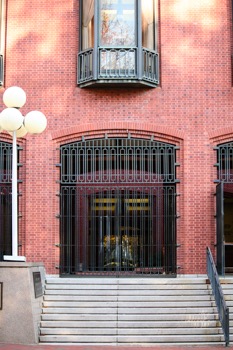 AbbVie Inc. v. MedImmune Ltd., No. 2017-1689, 2018 (Fed. Cir. Feb. 5, 2018) (Before Prost, C.J., Dyk, and Chen, J.) (Opinion for the court, Dyk, J.)
AbbVie Inc. v. MedImmune Ltd., No. 2017-1689, 2018 (Fed. Cir. Feb. 5, 2018) (Before Prost, C.J., Dyk, and Chen, J.) (Opinion for the court, Dyk, J.)
AbbVie and MedImmune entered a development and licensing agreement in 1995. The agreement stemmed from a research collaboration between the parties, resulting in the antibody adalimumab, the active ingredient in Humira. The contract is governed by British law, and licensed AbbVie to practice the ’516 patent, among other patents. AbbVie does not currently practice the ’516 patent. However, the agreement required AbbVie to pay royalties on the sales of certain antibodies “until the last to expire of [certain] Patents or the expiry of fifteen years from the date of First Commercial Sale of a Product by [AbbVie’s predecessor . . . (whichever is later).” The last of the patents to expire is the ’516 patent, with an expiration date of June 19, 2018. The first commercial sale occurred in January 2003; fifteen years later is January 2018. Therefore, AbbVie’s obligation to pay royalties ceased in either January 2018 or will cease in June 2018.
To accelerate the end of its royalty obligations, AbbVie brought a declaratory judgment action seeking a judgment that the ’516 patent is invalid. AbbVie argued that a declaration of invalidity would constitute expiration of the patent for purposes of the agreement, thus making the royalty obligations expire in January 2018. The district court dismissed the complaint on two grounds. First, AbbVie does not practice the ’516 patent and is not at risk of an infringement action. AbbVie, therefore, lacked standing to bring this action. Second, assuming AbbVie had standing, the agreement was governed by British law and would implicate the rights of the British government, which jointly owns the patent through one of its research councils. Deciding the invalidity question would not resolve the parties’ ultimate dispute and would raise additional concerns about foreign law and sovereign immunity. Thus, the court concluded decided not to exercise declaratory judgment jurisdiction as a matter of discretion. AbbVie appealed.
The district court erred in holding that AbbVie lacked standing because there is no controversy as to infringement of the ’516 patent. Courts examine declaratory actions, at least in part, by looking to the “mirror image” suit the declaratory defendant might bring. The district court mischaracterized AbbVie’s claim, which never rested on the possibility of infringement. Instead, it concerned the parties’ contractual obligations under the agreement. The Supreme Court and Federal Circuit have held that contractual disputes can be the subject of a declaratory action.
The real issue was that AbbVie did not seek a declaration of its contractual obligations. AbbVie’s complaint only sought a declaration of invalidity. The Supreme Court has held that in general “a litigant may not use a declaratory-judgment action to obtain piecemeal adjudication of defenses that would not finally and conclusively resolve the underlying controversy.” MedImmune, Inc. v. Genentech, Inc., 549 U.S. 118, 127 n.7 (2007). This is an application of the case-or-controversy requirement in a declaratory judgment context. Here, the agreement, which is governed by British law, links the end of AbbVie’s payments to the expiration of the ’516 patent. It is an open question whether British courts would consider invalidating a patent to be equivalent to its expiration for purposes of this agreement. Without resolving this question, the contractual dispute would continue.
The Court has occasionally permitted an exception to the rule against piecemeal adjudication in circumstances where litigation is also pending that would resolve the remaining questions. However, AbbVie has no other pending litigation that would resolve its contractual dispute with MedImmune. Therefore, the Court affirmed the district court’s dismissal.
Take Away
In general, parties may not seek a declaratory judgment to litigate one issue in a dispute that must await adjudication of other issues for complete resolution of the dispute. In limited circumstances, courts may permit this type of action where litigation is pending that would resolve the remaining questions.
[Troutman-Ad]
[Troutman-About]

![[IPWatchdog Logo]](https://ipwatchdog.com/wp-content/themes/IPWatchdog%20-%202023/assets/images/temp/logo-small@2x.png)


![[Advertisement]](https://ipwatchdog.com/wp-content/uploads/2024/05/Quartz-IP-May-9-2024-sidebar-700x500-1.jpg)
![[Advertisement]](https://ipwatchdog.com/wp-content/uploads/2024/04/Patent-Litigation-Masters-2024-sidebar-last-chance-700x500-1.jpg)
![[Advertisement]](https://ipwatchdog.com/wp-content/uploads/2024/05/Patent-Portfolio-Management-2024-sidebar-super-early-bird-with-button-700x500-1.jpg)

![[Advertisement]](https://ipwatchdog.com/wp-content/uploads/2021/12/WEBINAR-336-x-280-px.png)
![[Advertisement]](https://ipwatchdog.com/wp-content/uploads/2021/12/2021-Patent-Practice-on-Demand-recorded-Feb-2021-336-x-280.jpg)
![[Advertisement]](https://ipwatchdog.com/wp-content/uploads/2021/12/Ad-4-The-Invent-Patent-System™.png)







Join the Discussion
No comments yet.